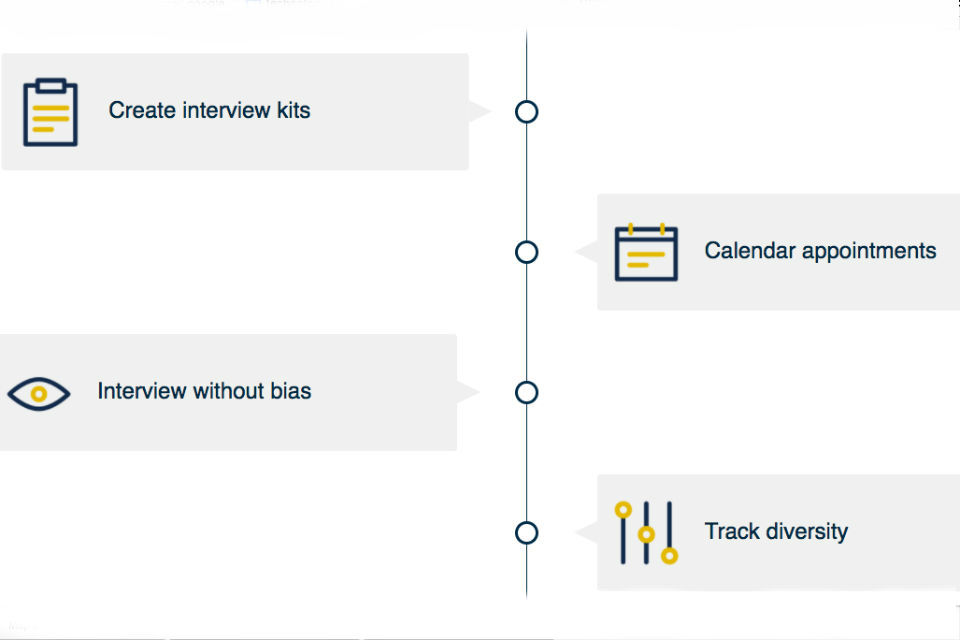
I have said many times that diversity and inclusion are key to a modern, effective Civil Service. I am passionate about this and that is why I made sure to embed diversity targets in my own objectives and those of all of our Permanent Secretaries. That’s also why I’m pleased to celebrate the launch today of a new recruitment tool called ‘Applied’ that will help us to realise this vision, and which I will talk more about in this blog.
It is worth reiterating why we care about diversity and inclusion.
There’s clearly a moral case. We should always be hiring and giving opportunity to the best and brightest, irrespective of their background. And there’s an operational case. We serve the public and we should aim to reflect the richness of our diverse society.
Finally, there’s an efficiency and effectiveness case. The evidence is clear that more diverse teams perform better, especially those that are trying to solve complex, ambiguous problems. This is because diversity is not just about physical characteristics but about differences in thought, outlook and approach. If we surround ourselves with people who look like us and see the world as we do, inevitably we will be more prone to ‘group think’, producing conclusions that reflect our shared outlook and preconceptions. Drawing on a greater variety of backgrounds and experiences of life will tend to avoid these narrow conclusions and provide the contrasting opinions and healthy disagreement that can put problems in a different light and produce better decisions.
To deliver this vision, we need to make changes to the way we run our HR operations throughout the Civil Service – from our hiring to our promotions, and everything in between. And like all systemic changes, we have to be open to the solutions coming from anywhere – from the data, from other organisations, or innovative ideas from within.
When we do so, it is important that we go with what the growing evidence-base shows works. For example, studies have consistently shown that when those taking hiring decisions know the names and backgrounds of those applying for jobs, it affects their perceptions of those individuals, even when their CVs are otherwise identical to other applicants’. That’s why, together with a host of other organisations, we have committed ourselves to introducing ‘name-blind’ applications across the Civil Service, so that details that should be irrelevant to the employer do not affect judgements on who we appoint.
Evidence also shows that through careful design we can move to a world where interviews go from being a ‘gut-feel’ exercise to a more evidenced and less biased assessment of candidate quality. Even simple things like getting interviewers to score candidates independently can make a difference to the outcome, ensuring that everyone’s perspectives are taken into account.
Alongside these pieces of research, a range of new tools has emerged that help organisations to draw on the latest available evidence and use it to run their recruitment programmes. ‘Applied’ is one such tool. It has been designed by the Behavioural Insights Team in partnership with the Cabinet Office and the innovation charity Nesta. And I’m pleased to say that the Civil Service, through the leadership of Chief People Officer Rupert McNeil, is one of 30 organisations now using this platform to help improve our recruitment programmes. Together with other changes we have made, Applied will help the Civil Service go further than we have ever done before in removing implicit bias from hiring decisions.

Applied is a cloud-based software that takes the lessons learned from the literature and redesigns the recruitment process to ensure that we pay attention to the thing that really matters: candidate quality. In addition to ‘blinding’, it reshapes how candidates’ information is reviewed, making it easier to compare like with like, avoid ‘halo’ effects (our tendency to let a good impression of a person in one area colour our opinion of them in others), and harness the wisdom of the crowd. Finally, by getting candidates to complete work-based assessments, it also focuses more on what they can do, not who they are, or what they’ve done in the past.
 So, I am very much looking forward to seeing the results of using the Applied platform, and the promise that this and our wider reforms make to building a more diverse and inclusive Civil Service and achieving our ambition of being the UK’s most inclusive employer.
So, I am very much looking forward to seeing the results of using the Applied platform, and the promise that this and our wider reforms make to building a more diverse and inclusive Civil Service and achieving our ambition of being the UK’s most inclusive employer.

8 comments
Comment by Ann posted on
I'll wait and see if this changes things any more than the numerous "diversity" schemes the Civil Service has deployed over the years. It is very hard for an organisation that went out of it's way to not employ diversely to make changes and become a bastian of inclusivity. A lot of the systems that were put in place to ensure that the wrong sort of person didn't get employed by the Civil Service are still in place today, albeit without many people realising the real reasons behind certain systems.
So while people can get a foot in the door we are unlikely to have true diversity across all grades and in the SCS until we deal with the systems. I see no appetite in the SCS to look at real issues, there does seem to be a lot of tinkering though.
Comment by Gavin Thomas posted on
Thank you Sir Jeremy for your blog. I would agree that Diversity and Inclusion is vital to any organisation if they wish to have a workforce that is refelective of modern society. It is also important that we have an environment can feel that they are being treated with faireness and respect and that they can be authentic.
I feel that we should commend the work carried out by the various Staff Associations, their achievements and their efforts in making it a "Great Place to Work".
Comment by Anon posted on
I do recall that we were told that competency based applications and interviews were the way forward when they were being introduced. I also recall being told that competency based applications and interviews were producing marvelous results (in previous blogs).
As such, perhaps, you need to think about what your message about Applied is saying the current competency based system and how can we have confidence that this Applied system will be any better than the competency based system.
I would also query how this fits in with the recent announcement of introducing psychometric (aptitude/attitude) tests into the recruitment process/ promotion exercises, for all grades and all jobs.
Comment by Sarah Appiah posted on
"This is because diversity is not just about physical characteristics but about differences in thought, outlook and approach. If we surround ourselves with people who look like us and see the world as we do....."
Wow, what a profound statement!
I am a big supporter of the Department's Agenda on Diversity and Inclusion and with the lauch of APPLIED I strongly believe it would bring the much needed change some of us have been craving for. Thank you.
Comment by Peter Taylor posted on
Group exercises among candidates are also extremely useful - helping to focus on the HOW they work as individuals, and equally importantly, with others. It may be challenging to do this for all recruitments but worth considering for shortlisted candidates for some posts.
Comment by Martin Connaghan posted on
Sir Jeremy,
This is a powerful statement of intent and great to see. Do you know when results will start to factor through?
I work in Northern Ireland, Belfast-I hope no matter where you are based throughout the UK and beyond the CPO can drive this one forward at a rapid pace. It is in many ways long overdue.
I am happy to volunteer if that helps, Belfast and NI sometimes seems to be last in the queue for these initiatives, whereas from what I see there is a real appetite to see more and more inclusion and diversity across all Public Sectors Depts and beyond.
Great blog, having read it have to say what a nice way for me to be starting my weekend.
KRs
Martin Connaghan
Comment by Helen Lederer posted on
I was fortunate enough to attend the launch event of Applied yesterday and was really impressed, not only by what it delivers but also by the way they have put user experience and simplicity in front of the really clever science.
Comment by Andrew Hilton posted on
it can't be any worse than the process we have now. I would be very happy to see the Civil Service move completely away from the competency-based interview system, which has been shown so often in my experience to reward creative writing and a lively imagination (that's the polite way of saying it) over an actual ability to do the job. I am half-way through an assessment centre as I write, and it is becoming rapidly obvious that this is a much better judge of capability than the system in place for most vacancies. (I wonder if my opinion will stay the same if I don't get the job?)